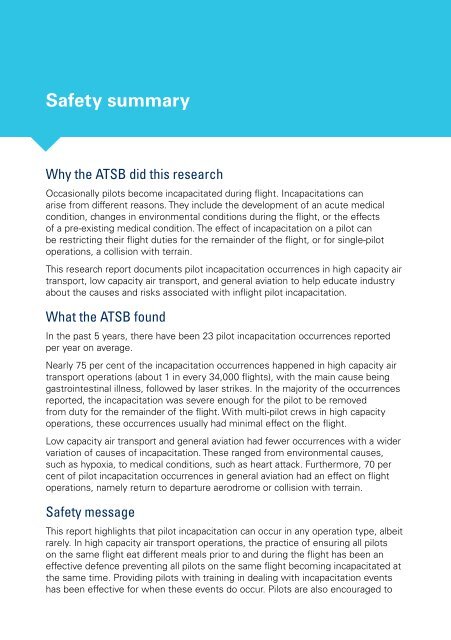Pilot incapacitation occurrences 2010–2014
8rKXy6YKY
8rKXy6YKY
Create successful ePaper yourself
Turn your PDF publications into a flip-book with our unique Google optimized e-Paper software.
Safety summary<br />
Why the ATSB did this research<br />
Occasionally pilots become incapacitated during flight. Incapacitations can<br />
arise from different reasons. They include the development of an acute medical<br />
condition, changes in environmental conditions during the flight, or the effects<br />
of a pre-existing medical condition. The effect of <strong>incapacitation</strong> on a pilot can<br />
be restricting their flight duties for the remainder of the flight, or for single-pilot<br />
operations, a collision with terrain.<br />
This research report documents pilot <strong>incapacitation</strong> <strong>occurrences</strong> in high capacity air<br />
transport, low capacity air transport, and general aviation to help educate industry<br />
about the causes and risks associated with inflight pilot <strong>incapacitation</strong>.<br />
What the ATSB found<br />
In the past 5 years, there have been 23 pilot <strong>incapacitation</strong> <strong>occurrences</strong> reported<br />
per year on average.<br />
Nearly 75 per cent of the <strong>incapacitation</strong> <strong>occurrences</strong> happened in high capacity air<br />
transport operations (about 1 in every 34,000 flights), with the main cause being<br />
gastrointestinal illness, followed by laser strikes. In the majority of the <strong>occurrences</strong><br />
reported, the <strong>incapacitation</strong> was severe enough for the pilot to be removed<br />
from duty for the remainder of the flight. With multi-pilot crews in high capacity<br />
operations, these <strong>occurrences</strong> usually had minimal effect on the flight.<br />
Low capacity air transport and general aviation had fewer <strong>occurrences</strong> with a wider<br />
variation of causes of <strong>incapacitation</strong>. These ranged from environmental causes,<br />
such as hypoxia, to medical conditions, such as heart attack. Furthermore, 70 per<br />
cent of pilot <strong>incapacitation</strong> <strong>occurrences</strong> in general aviation had an effect on flight<br />
operations, namely return to departure aerodrome or collision with terrain.<br />
Safety message<br />
This report highlights that pilot <strong>incapacitation</strong> can occur in any operation type, albeit<br />
rarely. In high capacity air transport operations, the practice of ensuring all pilots<br />
on the same flight eat different meals prior to and during the flight has been an<br />
effective defence preventing all pilots on the same flight becoming incapacitated at<br />
the same time. Providing pilots with training in dealing with <strong>incapacitation</strong> events<br />
has been effective for when these events do occur. <strong>Pilot</strong>s are also encouraged to


